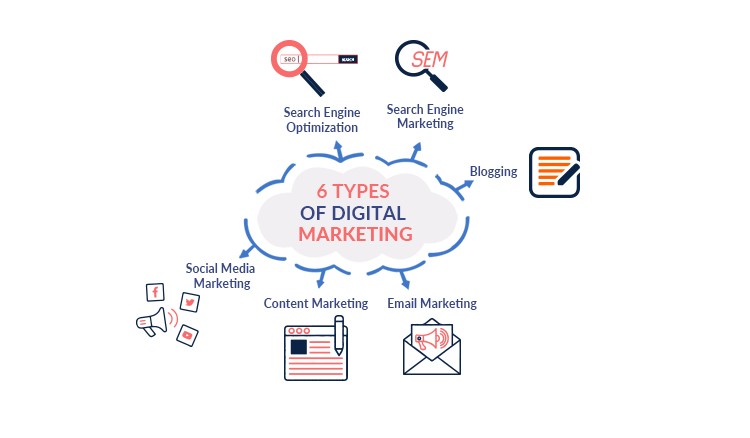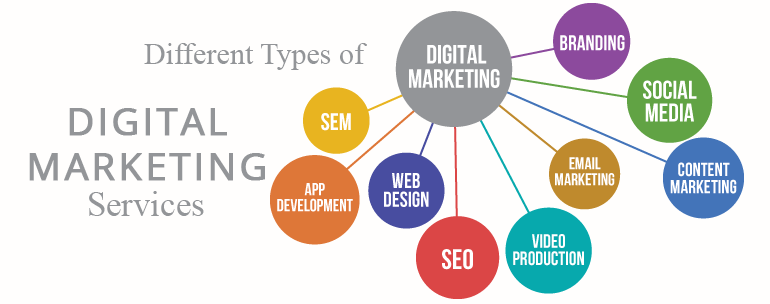Digital Marketing Specializations
Digital marketing encompasses numerous specializations, each serving as a distinct way to engage with audiences via digital media. Here, we highlight key examples of digital marketing tactics.

Digital marketing encompasses numerous specializations, each serving as a distinct way to engage with audiences via digital media. Here, we highlight key examples of digital marketing tactics.

Search engine optimization (SEO) Search engine optimization, commonly known as SEO, is a pivotal tool within digital marketing. It revolves around the concept of making web pages attractive to search engines. It’s both an art and science, as optimizing your content to rank high on search engine results pages (SERPs) requires a careful blend of techniques.
The science of SEO involves researching and evaluating various factors to enhance a webpage’s SERP ranking. Key considerations for optimizing a webpage include:
Beyond these aspects, technical SEO is essential, focusing on the back-end components of your site, such as URL structure, loading speed, and identifying and fixing broken links. Improving technical SEO enables search engines to navigate your site more efficiently.
Content marketing plays a pivotal role in digital marketing, focusing on the creation and distribution of valuable content to a specific audience. Unlike traditional advertising, content marketing offers free, valuable content to attract and engage potential customers. This content can take various forms, such as blog posts, e-books, newsletters, video or audio transcripts, whitepapers, and infographics.
The primary goal of content marketing is to generate leads that eventually convert into customers. To achieve this, it’s essential to produce content that ranks well in search engine results while also capturing the interest of your target audience. Relevant, engaging, error-free, and grammatically correct content can help establish strong relationships at various stages of the customer journey, guiding them towards actions like scheduling a consultation or signing up for a service.
To create effective content marketing strategies, it’s vital to identify your target audience first. Understanding your audience enables you to tailor the type of content you create, which may include videos, blog posts, printable worksheets, and more. Regardless of the content format, following content marketing best practices, such as producing high-quality and relevant material, is crucial for success.
Social media marketing is another powerful digital marketing strategy that involves engaging with people on social media platforms to increase brand awareness and drive traffic. The choice of social media platforms depends on your business goals and audience. For example, LinkedIn is suitable for targeting professionals, while Instagram may work better for reaching younger consumers. Social media marketing is highly interactive and can be used to initiate conversations with your audience.
Effective social media marketing practices include:
Pay-per-click marketing (PPC) is a digital advertising method where you pay for each click on your digital ads. This approach, often seen in search engine advertising using platforms like Google Ads, involves bidding for ad placement based on factors like ad quality, keyword relevance, landing page quality, and bid amount. PPC campaigns aim to achieve specific target actions, known as conversions, which can be transactional (e.g., purchases) or non-transactional (e.g., newsletter signups).
Key factors in PPC advertising include optimizing ad quality, choosing relevant keywords, and monitoring landing page quality to improve campaign performance. PPC offers a measurable way to track the success of your digital marketing efforts.
Email marketing involves sending promotional messages to a targeted audience, aiming to encourage recipients to take specific actions. Building an opt-in email list is crucial, and emails should be personalized, clearly communicate the type of content subscribers will receive, and provide a straightforward unsubscribe option. Email marketing is highly effective, with 89% of professionals considering it a top lead generator. Combining email marketing with marketing automation can further enhance its impact.
Important tips for successful email marketing include:
Blog marketing is a subset of content marketing, focusing on using blogs to connect with potential customers directly. It aims to build customer loyalty and brand identification by providing informative and entertaining content that engages readers. Blog marketing can involve collaborations with bloggers to promote products and demonstrate their usage, fostering brand loyalty. Readers can interact with content producers, creating a sense of community and engagement.
Need help? Our team is just a message away